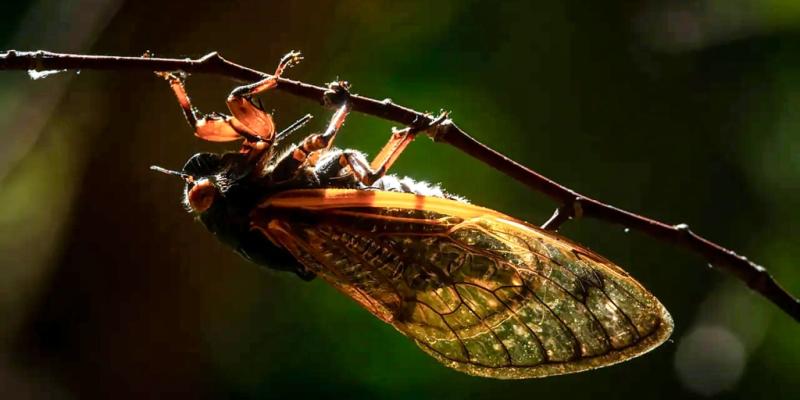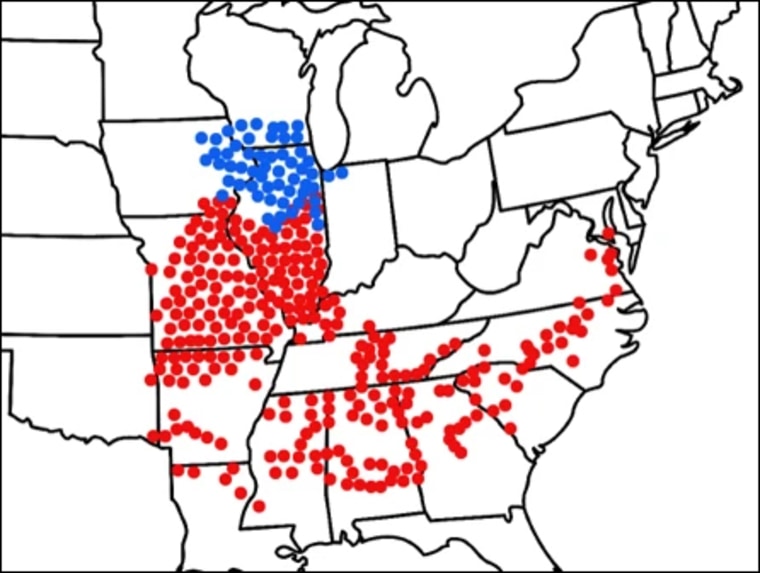Cicadas incoming: Billions to emerge in double-brood invasion



Tens of billions of noisy cicadas are set to pop out of the ground in the coming weeks in a rare synchronized event that last occurred 221 years ago.
The winged insects are expected to appear across the Midwest and Southeast starting early May, in a double emergence of two different broods of periodical cicadas. These bugs spend a fixed number of years underground before coming to the surface to take part in a raucous mating ritual.
This year's emergence is expected to be unusually large, with some experts estimating that more than a trillion cicadas could blanket parts of the country where the two broods overlap.
Cicadas are harmless to humans, though some people find the sheer number of insects and their loud mating songs a nuisance.
For bug enthusiasts, it's a once-in-a-lifetime opportunity to experience the two cicada broods emerging together, given that it last occurred in 1803, when Thomas Jefferson was president.
"It's something that no one alive today has ever seen and no one alive today will ever see again," said Jim Louderman, a collections assistant in the insect division at the Field Museum in Chicago. "For entomologists, it's a really, really huge deal."
This spring's emergence will feature Brood XIII and Brood XIX cicadas. The former group lives on a 17-year cycle and typically appears in the Midwest, mostly in Illinois, though also in parts of Iowa, Wisconsin and Indiana.
Brood XIX cicadas, meanwhile, live on a 13-year cycle and emerge over a much larger geographic area that includes Illinois, Missouri, Louisiana, North Carolina, Virginia and Maryland.
 The blue dots denote Brood XIII cicadas and the red dots are areas where Brood XIX has emerged in the past. All of these areas are likely to have cicadas in 2024.Cicada Safari
The blue dots denote Brood XIII cicadas and the red dots are areas where Brood XIX has emerged in the past. All of these areas are likely to have cicadas in 2024.Cicada Safari
Seven broods of periodical cicadas make their home in North America, and depending on the type, they emerge either every 13 or 17 years. A 13-year brood and a 17-year brood occasionally come out at the same time, but each specific pairing only sees their cycles align once every 221 years.
This year's event is unusual because these particular broods are syncing up and also because they happen to be adjacent to one another, with a narrow area of geographical overlap in central Illinois.
"There aren't many places in the country where two very different broods overlap," said Daniel Young, a professor of entomology at the University of Wisconsin-Madison and director of the school's insect research collection.
Thousands of cicada species can be found around the world, but periodical cicadas are distinct because they spend most of their lives underground, feeding on tree roots. After either 13 or 17 years, depending on the brood, the insects tunnel to the surface to begin a frenzied, monthlong search for a mate.
Louderman said he hasn't seen any reports yet of early cicada sightings. The insects usually pop up from underground once soil temperatures reach around 64 degrees Fahrenheit.
Some may start to emerge in early or mid-May, Louderman said. That should continue into June as conditions warm. Once the insects are out in full force, he and his colleagues will travel around Illinois to gather specimens for the Field Museum's collection.
Cicadas are perhaps best known for the racket they make when above ground. The insects' mating song, a high-pitched buzzing, is difficult to ignore and can reach up to 100 decibels.
"There's just so many of them that the noise is almost deafening," Louderman said. "It's like 1,000 chainsaws going off and they're all being used at the same time."
The insects have a few chaotic weeks to find a mate and lay their eggs before they die. After that, people will likely see a huge number of insect carcasses littering the ground.
"They literally pave the sidewalks and streets — it's just crazy," Louderman said. "Some people get kind of freaked out by it."
But, cicadas don't bite, Louderman added.
He describes himself as a "lifelong cicada enthusiast" and said his passion came about after an early brush with the insects.
"There was a periodic cicada emergence when I was 8, and that got me hooked on insects and entomology," Louderman said.
In the same way the total solar eclipse sparked wonder for many this spring, he said, perhaps some youngsters may find fascination in the cicada emergence and even decide to pursue his field of study.
At the University of Wisconsin-Madison, researchers plan to track where cicadas are spotted in order to map their range. Young is encouraging others to take part in the task, too.
People in the Midwest and Southeast can snap pictures of cicadas in their area and report the sightings on an app called Cicada Safari or on websites such as Bugsinourbackyard.org or Bugguide.net.
Young said he hopes people will seize the chance to experience the rare and significant event, particularly in the parts of Illinois where the two cicada broods overlap.
"Not many people in human history are going to be in a place where they can witness that," he said. "A lot of people may find it very unpalatable, but it's a pretty amazing thing."

Tags
Who is online
49 visitors

Roasted cicadas. Enjoy!!!
There was an article about the expected cicadas posted a couple of months ago.
Bacon wrapped. Everything goes better with bacon.
Make that Canadian bacon (a/k/a back bacon) for me.
I'm mildly disappointed this is not happening in my area. It gets pretty boring up here.
It happened a number of years ago here, but the problem was that I couldn't tell which was louder, the cicadas or my tinnitus.
You could do a favour for the "starving" people of Gaza, gather the cicadas up and send them there.